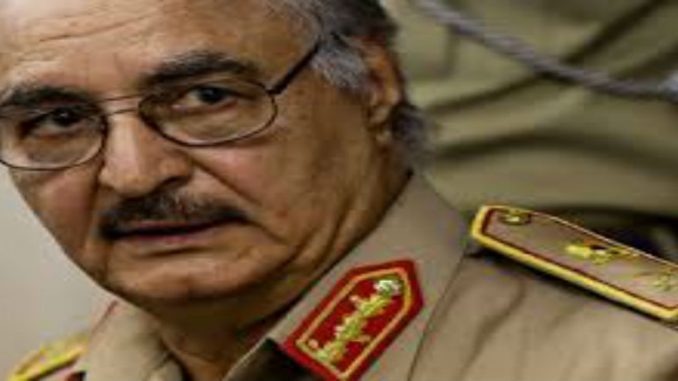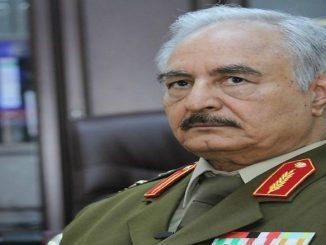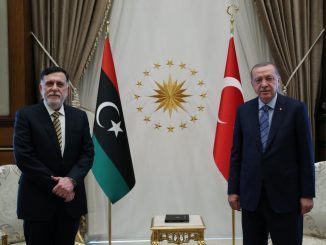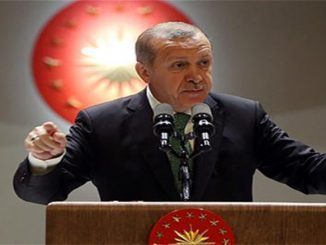
The Egyptian government’s attempts to mediate a peace deal between Presidency Council Chairman Fayez al-Serraj and General Khalifa Haftar were in ruins this evening after Haftar refused to meet al-Serraj, who then flew back to Tripoli.
Egypt’s chief-of-staff has mediated between two Libyan rivals who refused to meet face to face in Cairo but later agreed to form a committee to renegotiate a U.N. peace deal which was the only ray of hope that came out of the talk.
Both sides agreed that a committee be set up comprising 15 member each from the HoR and the State Council to look at changes to the Libyan Political Agreement.
According to Egyptian army spokesman Col. Tamer el-Rifai, the two – the head of Libya’s U.N.-backed government, Fayez al-Serraj, and Khalifa Haftar,the commander of the militias known as the Libyan National Army(LNA) – met separately with Egypt’s chief-of-staff, Lt. Gen. Mahmoud Hegazy late on Tuesday.
He said that they agreed to form a joint committee that would make key changes to the 2015 U.N.-brokered peace deal.
“Once the parliament, based in eastern Libya, endorses the changes, it would pave the way for parliamentary and presidential elections next year,”as reported by Associated Press.
A source within the Haftar camp said that while al-Serraj did agree to the proposal, which would see him remain in office for another year, Haftar did not. For his part, the House of Representatives (HoR) president, Aqila Saleh, was non-committal, saying that he would study the idea, according to Libyan Herald.
After yesterday’s separate meetings in Cairo, Al-Serraj and Haftar were supposed to join in a meeting today chaired by Abdel Fattah al-Sisi. In the event, Serraj remained waiting all day at his hotel and Aqila Saleh at another while Egyptian officials at the intelligence headquarters tried to pressurize Haftar into compromise.
However, Haftar refused to accept al-Serraj’s plan for a three-man presidency, a separate government, the position of commander-in-chief to be held jointly by the heads of the Presidency Council, the HoR and the State Council and a supreme military council which would include the Haftar.
In fact, the failure is a blow to months of increasingly coordinated Egyptian, Algerian and Tunisian diplomacy.
It is worth to mention that Al-Sisi’s military and political officials have been working throughout the previous months with different Libyan factions to resolve the Libya’s political deadlock on one hand and to strengthen Haftar’s role in Libya on the other hand, especially by focusing on amending the Political Agreement (PA) article that outlined the authorities of the Libyan army chief commander and that also excluded Haftar from leading the army.
In this context, excessive meetings have been held, under Egypt’s auspices, with several Libyan officials and members in Tobruk’s House of Representatives to resolve the Libyan crisis and amend the Skhirat agreement in a way that enclose Libya’s strongman in the political process.
On December 13, 2016, Cairo hosted a conference attended by Libyan officials and representatives from the country’s numerous factions, where they issued a declaration of principles and five proposed amendments to an agreement, brokered by the UN in 2015.
The Libyan Political Agreement, signed in Skhirat, Morocco December 2015 known as the Skhirat Agreement, intensified the internal strife rather than resolving it.
The conference concluded an agreement on amending the 8th article of the 2015 agreement that outline the authorities of the Libyan army chief commander.
The article constituted a major obstacle during signing Skhirat agreement as it included the exclusion of General Khalifa Haftar from leading the army.
The conference meetings were brokered under the auspices of the Egypt’s General Intelligence Directorate and in a hotel related to the security entity.
The conference concluded what the participants consider as “a road map to achieve unity in Libya during the coming period, “and one of the major recommendations presented by the participants, “to reconsider the responsibilities of the army chief commander that is currently held by Aqila Saleh, the head of Tobruk’s House of Representatives (HoR), who has promoted General Khalifa Haftar to Field Marshal last September.
Accordingly, Egypt was putting pressure on Haftar to meet al-Serraj and agree a compromise that would open the doors to a settlement in Libya after working on amending article 8 in the (PA) .
Days ago, Libya Prospect, a Libyan News Website, cited a source inside the Egyptian Foreign Ministry saying that FM Sameh Shoukry has asked in a meeting with his Emirati counterpart, Abdallah Bin Zayed, Emirati leaders to “pressure Haftar to avoid any moves that could escalate new conflicts.”
According to the Egyptian sources, “Haftar opposed the Egyptian efforts to organize a meeting with the head of the Presidential Council (PC) of the Government of National Accord (GNA), Fayez Al-Serraj in Cairo.” The proposal was made by Russia, holding to a military approach.”
Up until last month, he resolutely refused to do so.
Haftar is a military figure, backed by Tobruk government based in eastern Libya that refuses to recognize the U.N.-backed government, enjoys the support of several Arab nations, including Egypt, the United Arab Emirates, and Jordan, as well as western countries as France.
Since the Libyan Revolution that overthrew the long-time dictator 2011 Muammar Gaddafi, violence has spread in Libya among the different Libyan factions.
Two rival governments operate in Libya, with self-proclaimed authorities controlling the capital of Tripoli and adjacent western areas and an internationally recognized government, based in the eastern Libyan city of Tobruk.
Moreover, a third government was formed known as the Government of National Accord(GNA) supported by many western countries. The government has so far failed to restore the country’s unity.
None of the governments has a complete dominance over Libya until now.



